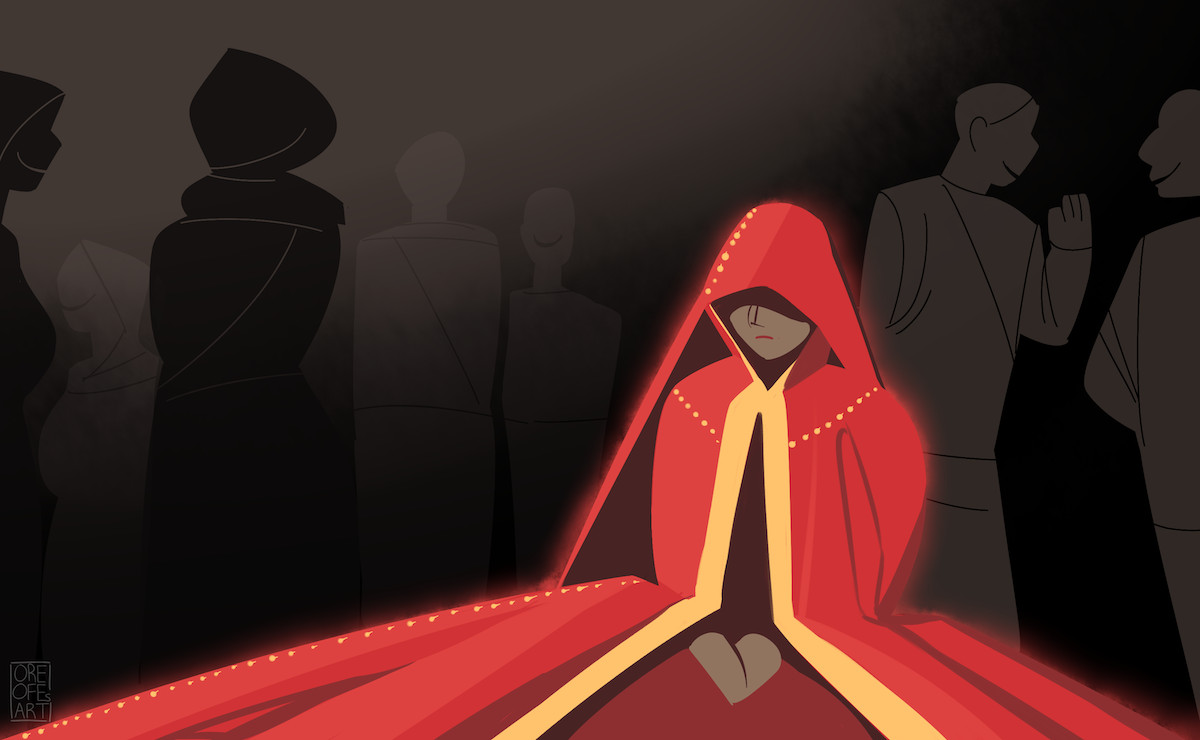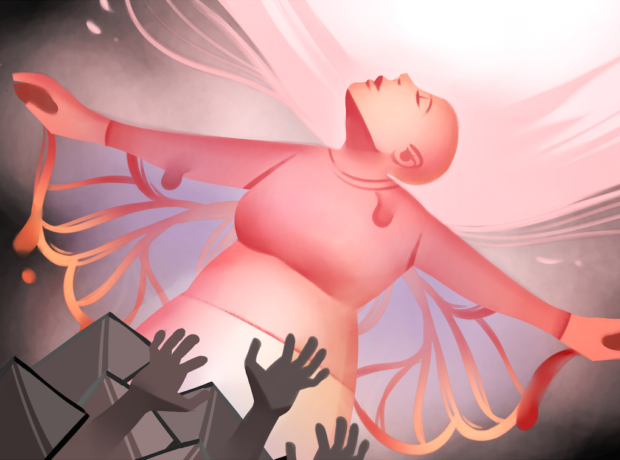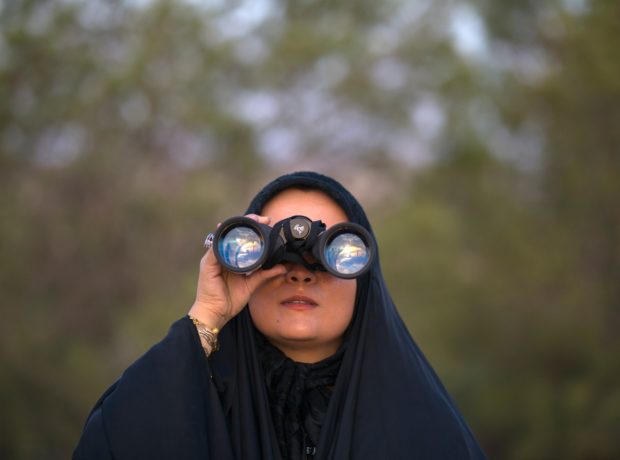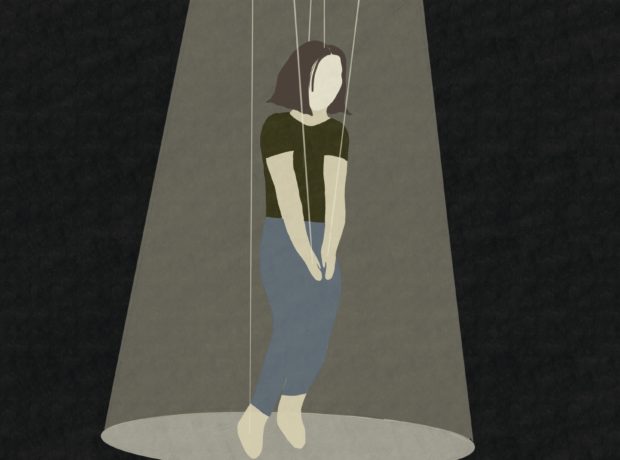One woman struggles to prepare herself for a forced marriage in this daring and unusual poem. The invisible briefly becomes visible as her conflicting emotions are revealed.
Samiya Saif Ullah is the runner-up in the University of Warwick’s fifth annual Writing Wrongs Schools’ Competition, organised by the Centre for Human Rights in Practice. This is her highly commended poem, which she reworked with Lacuna Magazine.
All images by Oreofe Morakinyo.
The last exam came,
and the struggle was over.
But her warped smile and tense eyes sat still.
She spoke as if the air was jagged,
the shards catching on to her voice.
Her bleeding speech was penetrating,
the struggle scorching her skin, burning her up alive.
I don’t know how many times you have to live
to see anguish that burned to keep on the inside.
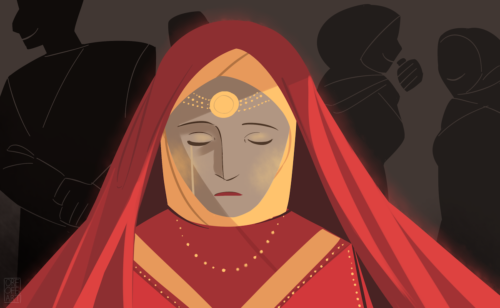 Nobody was expecting it.
Nobody was expecting it.
Not when she held her hands to stop them shaking,
or when she choked on
the same words over and over.
But the broken
words she spat out, formed the fact that
she was getting married, before the year was over.
Her mum said he’s a nice guy. A good man.
He’ll look after her.
But she couldn’t look her mother in the eye and
take her honour and rip it in two.
Because to them what is life without honour,
pungent like a rancid perfume?
Her life was never hers.
She was promised to marriage,
this sweet sacred sacrament.
This warped ritual.
Sweet English rose, she must be
managed. 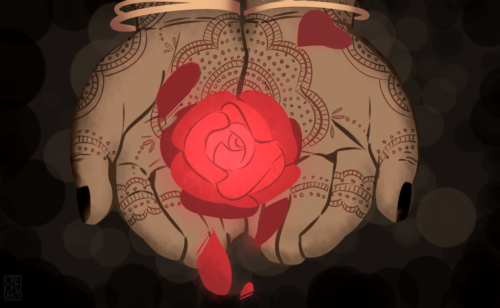
Pull out the weeds before they
interfere
with the sweet splendour
of the rose.
As the summer progressed,
the humid heat sank into her flesh.
These families had known each other their whole lives,
and her words broke in half
as she watched how they helped.
The bright colours could not mask
the sour taste in her mouth.
Blood is thicker than water. Blood is thicker than
Water.
So why did they not act, as family?
To hear about the mehndi,
about the red flowers delicately drawn into her skin,
the golden glow on her cheeks,
the first step of her married life.
Nobody saw the red beneath the henna stain,
the fiery red and pulsing blood.
Nobody saw the broken glass bangles on the table.
The smell of love was peeling, flaking in the corner.
Then the panic set in, it lunged for her.
The summer was eating into her, and yet
she could not dissolve these manacles,
she could not rip away the layers of guilt and worry.
The celebrations and the people,
these people are rushing in, rolling their palms
on her cheeks. The grimace of the decor –
slowly picks at her insides.
She sews on the workings of a smile and
envelopes herself in a lengha,
and acts a stranger to celebration. Sitting
in attire much too bright for her, she
looks like the sun setting on a radiant afternoon. 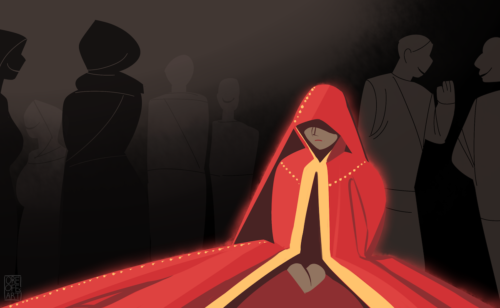
They’re bystanders, all appeasing bystanders.
How can anyone hold the broken pieces of her world
and mould it back into strength?
The dried rose leaves have more colour in their cheeks,
but the events around her
have sculpted her into soft stone.
She is sat like she has heaven injected into her upturned lips,
a glazed resin over her gold-sewn skin.
You cannot read her, despite her story seeping out of her skin.
You cannot read her.
The Nikkah is to happen,
the exchange of each other is to happen too.
The stress is alive,
tingling in her shoulders like soft tv static.
But she has cut away her tongue.
The recitation of the Quran commences,
but when the Islamic teaching says
‘a woman without a husband
must not be married
until her permission is sought‘,
these people are silent.
Their tongues coated in honour and shame.
Under harsh lights and tight smiles,
the doubt on her face slowly rises
as she picks up the pen.
As she covers her wrists,
the glaze on her skin is turning
to dust. This resin is cracking.
Realisation softly sinks in.
She let the pain pour by her,
let it spit on and splatter her soft splendour.
But she cannot peel away this commitment.
Honour has sealed her lips, the sweet poison.
As she takes the pen
even time is dense,
as pieces of realisation start to fall in her lap
more eyes turn fiery, embedding her neck. 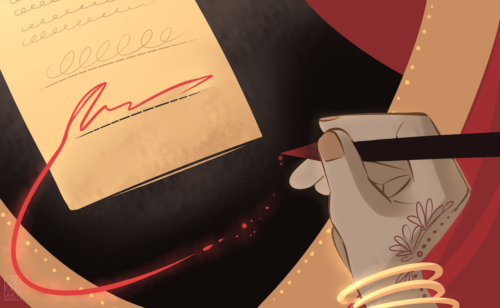 The pen trembles, but after moments the contract
The pen trembles, but after moments the contract
reads her name.
It is done.
She belongs to honour, and lives with violence.
